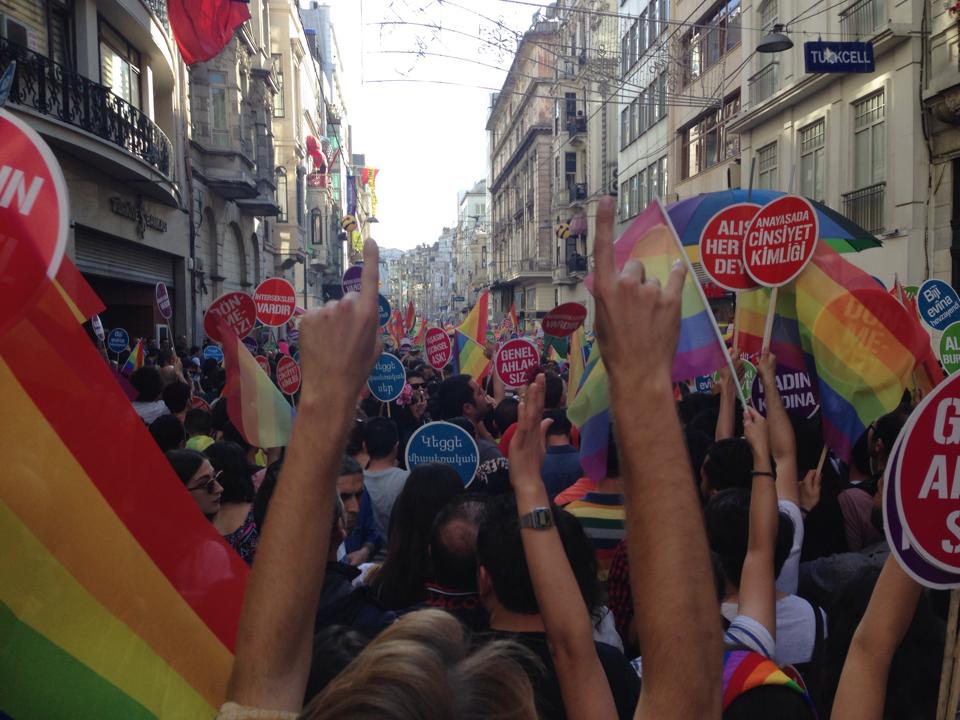The Onur Yürüyüşü, Istanbul’s annual march in favor of homosexual and transgender rights, this year celebrates its 11th anniversary.

Since year 2003, manifestations take place either every last Sunday of June or first Sunday of July, in the main Turkish city, with very satisfactory participation rates. This year’s parade was highly followed by international media – giving it a wider importance on the international arena – not only because a different ambiance was already expected this year due to the recent Gezi’s first anniversary, that by consequence would have had a stronger impact on this year’s event, but also for the particularly high participation rate, the highest since the beginning of this annual meeting.
June 30th 2013, the march attracted tens of thousands of participants, joined by people from the Occupy Gezi movement, making the Istanbul Pride Parade the biggest civil manifestation that ever took place in Turkey. This year, its success exceeded every expectation: from just 30 participants in 2003, to 5,000 in 2010 to 100.000 on the 30th of June 2014, Istanbul’s Gay Pride is today one of the biggest civil marches of Europe.
The participants gathered first in Taksim Square, to later march together along the famous İstiklal Avenue, one of the most important boulevard of Istanbul, known especially as the street symbol of Islamic celebrations, like the Bayram and the first evening of Ramadan, that this year began the same Sunday as the march. All the participants walked for more than two hours, bearing rainbow-colored flags and slogans, under the usual tight supervision of the government police.
It is fundamental to point out that the Istanbul Pride Parade is not a manifestation officially allowed by the government, and is usually organized without the permission of the municipal authorities. The few politicians that join the march are the ones from the opposition, like Sirri Sureyya Onder, important actor of Gezi’s protests and main antagonist of the current PM. Members from the EU Parliament joined the event as well, also to make sure that local authorities would guarantee fundamental rights and basic civil freedoms to LGBT groups during the manifestations.
The one of Istanbul is the biggest manifestation of LGBT pride in a Muslim country.

Unlike most of the other Muslim countries, homosexuality is not a crime in Turkey; however, homophobia is highly widespread and usually followed by acts of violence. In 2010, an AKP party member defined homosexuality as “a disease that must be cured”; the AKP in general has always been opposed to creating laws in favour of LGBT rights or against homophobic crimes. In the past few years there have been many cases of homosexuals and transgenders citizens assassinated by their parents or relatives because of their sexual orientations.
“In this country every kind of “difference” is hard to declare or to accept. From ethnic minorities to the sexual ones, it is becoming more and more difficult to express one’s own individuality in Turkey without worrying to be judged” – says Beril, a student from Marmara Universitesi, one of the organizers of the event.
The catch-phrases, either screamed or written on banners “We do not want a homophobic State”, “Love has no gender”, “Another kind of family does exist”, etc, make clear the necessity of social change and the need to keep manifestations like the Onur Yürüyüşü alive, in order to make freedom of expression and self-determination easier to achieve, even if just for a day.
Since year 2003, manifestations take place either every last Sunday of June or first Sunday of July, in the main Turkish city, with very satisfactory participation rates. This year’s parade was highly followed by international media – giving it a wider importance on the international arena – not only because a different ambiance was already expected this year due to the recent Gezi’s first anniversary, that by consequence would have had a stronger impact on this year’s event, but also for the particularly high participation rate, the highest since the beginning of this annual meeting.







